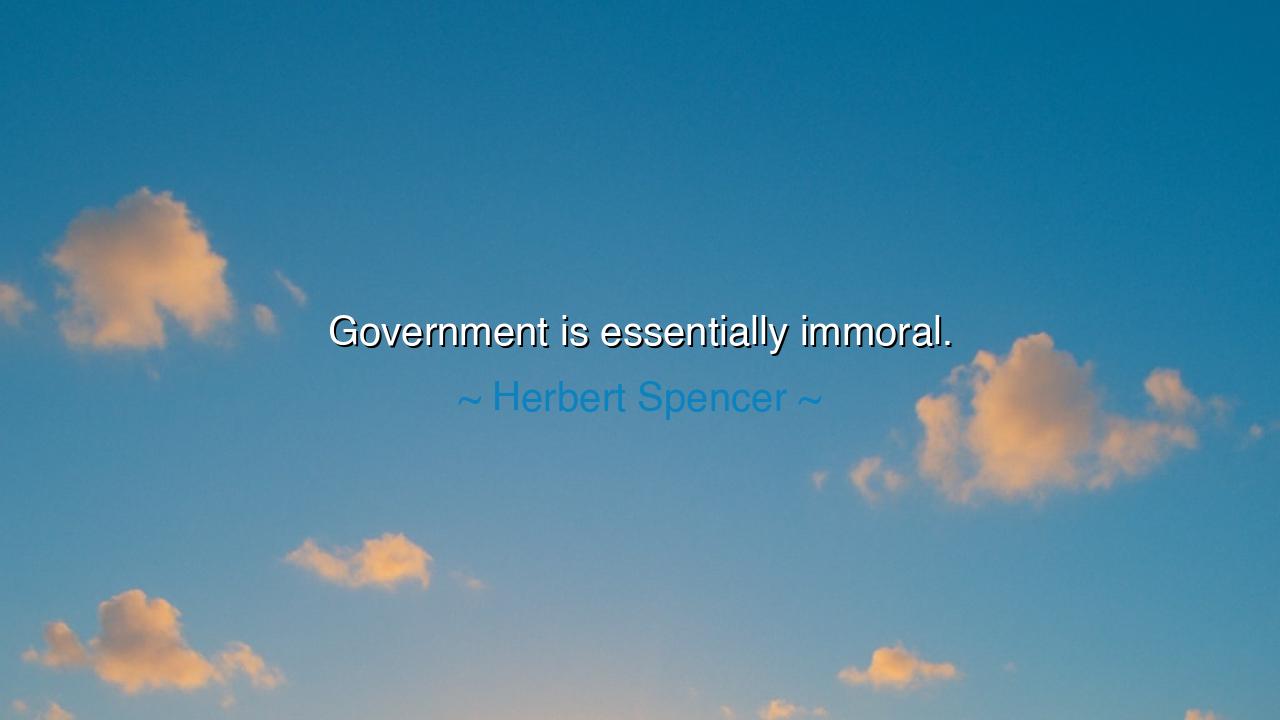
Government is essentially immoral.






"Government is essentially immoral." — Herbert Spencer
Hear now, O children of reason and conscience, the words of Herbert Spencer, a philosopher of fierce intellect and unwavering principle. When he declared, “Government is essentially immoral,” he did not speak in the heat of rebellion or in the bitterness of a defeated soul — he spoke as a man who had peered into the very heart of power and found there a corruption older than kings. His words are not a denial of order, but a revelation of truth: that when one man gains the power to command another, the moral balance of the universe tilts. For what is government, Spencer asks, but a system that claims the right to compel — to take, to punish, to rule — by force rather than persuasion? And wherever force replaces reason, there, morality is betrayed.
The meaning of his statement is not that all forms of governance are evil in the same measure, but that the act of coercion itself stands in contrast to moral law. To compel a man to act against his will — even for what another deems “the common good” — is to trespass upon the sacred ground of his conscience. Spencer saw that true morality arises only from voluntary action — from the free choice to do right, not the compelled obedience to authority. Thus, a society governed by law rather than conscience, by compulsion rather than consent, may preserve order, but it cannot nurture virtue. For virtue born of fear is not virtue at all — it is submission dressed in respectability.
The origin of this philosophy grew from Spencer’s belief in individual sovereignty — the idea that every man and woman owns themselves absolutely, body and mind alike. He lived in the nineteenth century, an age of industrial progress but also of expanding government control, when nations began to sacrifice liberty at the altar of regulation and empire. Spencer watched as governments taxed the laborer, conscripted the young, and claimed the power to decide what was best for all. He warned that such control, however well-intentioned, was built upon moral theft — the theft of one person’s freedom for another’s supposed benefit. To govern by force, he said, is to violate the very principle of justice it claims to defend.
Consider, my friends, the history of nations — and you will see that Spencer’s warning has echoed through every age. Think of the Roman Empire, whose laws brought order but whose legions enforced obedience with blood. Rome called her domination “civilization,” yet her peace was the peace of chains. Or look to more recent times: the regimes that promised equality, safety, or prosperity — yet delivered terror, censorship, and war. In each, the pattern repeats. When government grows bold enough to play god — deciding who may speak, who must serve, who may live or die — morality withers, and power devours its own soul. For no authority, however righteous in its beginnings, remains pure when it demands obedience through fear.
But take heed: Spencer’s wisdom is not a cry for anarchy, but a call for conscience. He did not say that society should dissolve into chaos, but that order should arise from mutual respect and voluntary cooperation, not compulsion. He envisioned a civilization where law is not a weapon, but a contract freely entered; where peace is not imposed, but chosen; where citizens are not ruled, but self-governed. For he believed that the greatest progress of humanity comes not from the commands of rulers, but from the moral awakening of individuals — from men and women who act rightly because they know it is right, not because they fear punishment.
And yet, O listeners, the temptation of power remains — the illusion that men can perfect the world through control. It is an ancient dream that always ends in the same nightmare. Governments promise protection, but they extract obedience; they promise justice, but they administer it unevenly; they promise morality, but they enforce it by violence. Spencer’s words strike like lightning through this delusion: no moral good can be born of coercion. To rule another against his will is to forget that he, too, is divine — that he, too, bears the sacred image of freedom.
So, let this be your lesson: true morality begins where compulsion ends. Live by conscience, not command. Serve your fellow man by choice, not decree. Question all authority that claims virtue as its excuse for force. For governments may shape laws, but only individuals can shape justice. If you would build a world that is righteous, do not look to thrones or parliaments — look within. There, in the quiet kingdom of the soul, dwells the only government that can be truly moral: the rule of conscience guided by reason and love.






AAdministratorAdministrator
Welcome, honored guests. Please leave a comment, we will respond soon